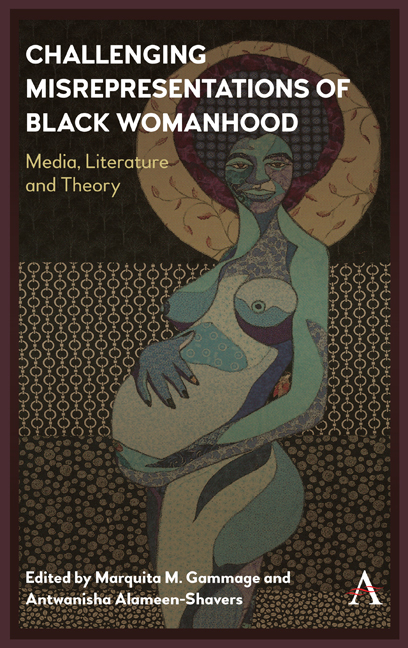Book contents
- Frontmatter
- Contents
- List of Figures
- Acknowledgments
- Introduction
- Chapter 1 Black Student Mothers: A Culturally Relevant Exploratory Study
- Chapter 2 Uninhabitable Moments: The Symbol of Serena Williams, Rage and Rackets in Claudia Rankine's Citizen: An American Lyric
- Chapter 3 “Black Women Are Genius!”: The Image of Celebrated Black Motherhood in Stand-Up Comedy?
- Chapter 4 The Virility of the Haitian Womb: The Biggest Threat to the Dominican Right
- Chapter 5 Ladyhood in Distress: Neoliberalism and Black Politics in Nicole Sconiers's Escape from Beckyville: Tales of Race, Hair, and Rage
- Chapter 6 Sapphires Gone Wild: The Politics of Black Women's Respectability in the Age of the Ratchet
- Chapter 7 Representing the Black Woman as Immoral and Abandoning the Black Family: A Cultural Analysis of Twenty-First-Century Television Dramas Starring Black Women
- Chapter 8 Historical Miseducation on Black Womanhood
- Chapter 9 Michelle Obama Laughs: Political Meme Warfare and the Regurgitation of the Mythological Black Woman
- Chapter 10 Kawaida Womanism as an Interpretative Framework for Understanding Africana Womanhood: Analyzing African American Women's Self-Perceptions
- List of Contributors
- Index
Chapter 9 - Michelle Obama Laughs: Political Meme Warfare and the Regurgitation of the Mythological Black Woman
Published online by Cambridge University Press: 29 May 2019
- Frontmatter
- Contents
- List of Figures
- Acknowledgments
- Introduction
- Chapter 1 Black Student Mothers: A Culturally Relevant Exploratory Study
- Chapter 2 Uninhabitable Moments: The Symbol of Serena Williams, Rage and Rackets in Claudia Rankine's Citizen: An American Lyric
- Chapter 3 “Black Women Are Genius!”: The Image of Celebrated Black Motherhood in Stand-Up Comedy?
- Chapter 4 The Virility of the Haitian Womb: The Biggest Threat to the Dominican Right
- Chapter 5 Ladyhood in Distress: Neoliberalism and Black Politics in Nicole Sconiers's Escape from Beckyville: Tales of Race, Hair, and Rage
- Chapter 6 Sapphires Gone Wild: The Politics of Black Women's Respectability in the Age of the Ratchet
- Chapter 7 Representing the Black Woman as Immoral and Abandoning the Black Family: A Cultural Analysis of Twenty-First-Century Television Dramas Starring Black Women
- Chapter 8 Historical Miseducation on Black Womanhood
- Chapter 9 Michelle Obama Laughs: Political Meme Warfare and the Regurgitation of the Mythological Black Woman
- Chapter 10 Kawaida Womanism as an Interpretative Framework for Understanding Africana Womanhood: Analyzing African American Women's Self-Perceptions
- List of Contributors
- Index
Summary
If you want your life to be a magnificent story, then begin by realizing that you are the author and everyday you have the opportunity to write a new page.
— Mark HoulahanIntroduction
As a Black woman and voting citizen in 2008, it was exciting to know that America could have a Black woman as its first lady in my lifetime. However, that excitement was quickly challenged when I logged into Facebook to see that people who had been friends for most of their life were arguing about the racial implications of the July 21, 2008, cover of the New Yorker (Blitt 2008). The cover sparked an immediate public outcry for its racist depiction of the Obamas. The image, regardless of its satirical intent, became a ghostly reminder of the way that Michelle Obama, a Black woman, citizen of the United States, is viewed in America a mere 153 years after the last enslaved African was freed.
Michelle Obama's image, like that of a number of successful Black women, is shrouded in myth. For strong proponents of oppressive agendas, it is exceptionally remarkable when Black people escape systems disguised as American democracy meant to block their access to privileges guaranteed by the Constitution. In her college thesis, Michelle Obama reflects on her place in America that sees her as Black before all else (Robinson 1985). Rather than the problematic nature of her existence in the system being discussed, it is Michelle Obama's lack of gratitude shown toward the oppressor that became the focus of the discussion. Those who chose to diminish her personhood were certainly going to question her ability to serve as first lady of the United States. Participants in maintaining the system wonder how Black people like Michelle Obama managed to escape the margins. How is it that she was able to attend Princeton and Harvard? How is possible that she survived the election and subsequent eight years as first lady despite many Americans challenging her authority due to her race and gender? How did she manage to survive the social media assaults on her character? “Michelle Obama most forcefully encountered the myths about black women in three areas: conversations about her body, discussions about her role as mother, and speculations about her marriage” (Harris-Perry 2013, 277).
- Type
- Chapter
- Information
- Challenging Misrepresentations of Black WomanhoodMedia, Literature and Theory, pp. 167 - 180Publisher: Anthem PressPrint publication year: 2019



